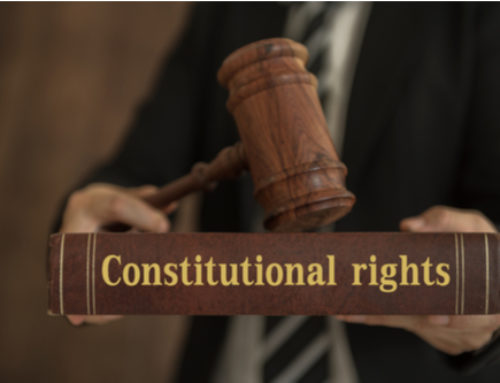Facing any criminal charge in Arizona is a serious matter. But, if you are being charged with a felony offense, the consequences of a conviction could be far more severe. The standard (or “presumptive”) prison sentences for felony offenses start at one year of incarceration—and they go all the way to capital punishment for the most serious crimes.
As a result, if you have been arrested for a crime in Arizona, you need to know if you are being charged with a felony offense. If you are being accused of a felony, you also need to know the “Class” of the felony charge that prosecutors are pursuing. This is one of the key factors determining what is at stake in your case, which is important to know when making decisions about your defense.
Arizona’s Classes of Felony Crimes
Under the Arizona Revised Statutes, there are six classes of felony offenses. These classes are labeled as Class 1 through Class 6. This is not to be confused with the “degrees” of crimes that prosecutors can charge. The degree of a crime determines what prosecutors need to prove, and different degrees of a crime can fall into one or more classes for sentencing purposes.
Here are some examples of crimes that fall into each of Arizona’s six felony classes:
Class 1 Felonies
- First-degree murder
- Second-degree murder
Class 2 Felonies
- Attempted murder
- Manslaughter
- Aggravated assault (certain violations)
- Drive-by shooting
- Discharging a firearm at a residential structure
- Kidnapping (certain violations)
- Sexual assault
- Child molestation
- First-degree burglary
- Theft (property or services with a value of $25,000 or more)
Class 3 Felonies
- Attempt of a Class 2 felony
- Solicitation of murder
- Aggravated assault (certain violations)
- Discharging a firearm at a nonresidential structure
- Kidnapping (certain violations)
- Sexual abuse (if the victim is under 15 years of age)
- Second-degree burglary
- Theft (property or services with a value of $4,000 or more but less than $25,000)
- Aggravated robbery
- Aggravated identity theft
Class 4 Felonies
- Attempt of a Class 3 felony
- Solicitation of a Class 2 felony
- Racing (certain violations)
- Aggravated operation or actual physical control of a motorized watercraft while under the influence (certain violations)
- Negligent homicide
- Aggravated assault (certain violations)
- Kidnapping (certain violations)
- Voyeurism (certain violations)
- Third-degree burglary
- Theft (property or services with a value of $3,000 or more but less than $4,000)
Class 5 Felonies
- Attempt of a Class 4 felony
- Solicitation of a Class 3 felony
- Facilitating murder
- Aggravated assault (certain violations)
- Failure to stop after a watercraft collision (accident involving death or serious physical injury)
- Restraining order violations (certain violations)
- Sexual abuse (if the victim is 15 years of age or older)
- Voyeurism (certain violations)
- Theft (property or services with a value of $2,000 or more but less than $3,000)
- Shoplifting (certain violations)
Class 6 Felonies
- Attempt of a Class 5 felony
- Solicitation of a Class 4 felony
- Unauthorized release of animals
- Restraining order violations (certain violations)
- Endangerment (involving substantial risk of imminent death)
- Aggravated assault (certain violations)
- Unlawful imprisonment
- Indecent exposure (to a person under 15 years of age)
- Sexual conduct with a minor (15 years of age or older)
- First-degree criminal trespass (certain violations)
Again, these are just examples. There are many more felony crimes under Arizona law. If you’ve been charged with a crime, our defense lawyers can evaluate the charges against you, determine what penalties are on the table, and identify your available defenses.
Arizona’s Felony Penalties (By Class)
Arizona law establishes a range of possible prison sentences for felonies in each Class. At the middle of the range is the “presumptive” sentence, or the sentence the court will generally impose absent any mitigating or aggravating factor. Suppose the judge or jury finds one mitigating factor. In that case, the court can impose the “minimum” sentence (which isn’t actually the minimum in most cases). If the judge or jury finds two mitigating factors, the court can impose the “mitigated” sentence.
On the other side of the coin, if the judge or jury finds one aggravating factor, the court can impose the “maximum” sentence (which isn’t actually the maximum in most cases). If the judge or jury finds two aggravating factors, the court can impose the “aggravated” sentence.
For a first-time, non-dangerous felony offense, the potential prison sentences are as follows:
Class 2 Felonies
- Mitigated Sentence: 3 years
- Minimum Sentence: 4 years
- Presumptive Sentence: 5 years
- Maximum Sentence: 10 years
- Aggravated Sentence: 12.5 years
Class 3 Felonies
- Mitigated Sentence: 2 years
- Minimum Sentence: 2.5 years
- Presumptive Sentence: 3.5 years
- Maximum Sentence: 7 years
- Aggravated Sentence: 8.75 years
Class 4 Felonies
- Mitigated Sentence: 1 year
- Minimum Sentence: 1.5 years
- Presumptive Sentence: 2.5 years
- Maximum Sentence: 3 years
- Aggravated Sentence: 3.75 years
Class 5 Felonies
- Mitigated Sentence: 0.5 years
- Minimum Sentence: 0.75 years
- Presumptive Sentence: 1.5 years
- Maximum Sentence: 2 years
- Aggravated Sentence: 2.5 years
Class 6 Felonies
- Mitigated Sentence: 0.33 years
- Minimum Sentence: 0.5 years
- Presumptive Sentence: 1 year
- Maximum Sentence: 1.5 years
- Aggravated Sentence: 2 years
Note that we said these were the potential prison sentences for first-time, non-dangerous felonies. If you are being charged as a repeat offender, or if you are being charged with a “dangerous” felony, then you are facing enhanced penalties. A “dangerous” felony is defined as a crime involving either (i) discharge, use, or threatening exhibition of a deadly weapon or dangerous instrument or (ii) intentional or knowing infliction of serious physical injury. Finally, murder charges under Class 1 carry sentences ranging from 10-25 years (second-degree murder) to life imprisonment or the death penalty (first-degree murder).
Discuss Your Felony Case with a Criminal Defense Lawyer in Confidence
If you are facing a felony charge in Arizona, you must discuss your case with an experienced criminal defense lawyer as soon as possible. Regardless of the facts involved, you have defenses available. To schedule an appointment with an experienced lawyer at The Weingart Firm, call 480-405-7922 or request a free consultation online now.






